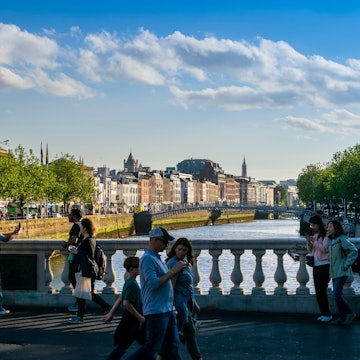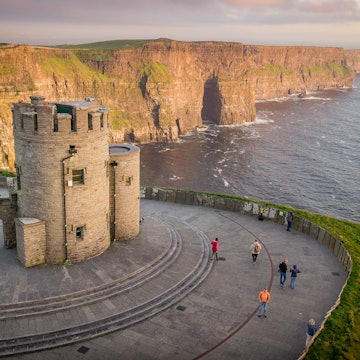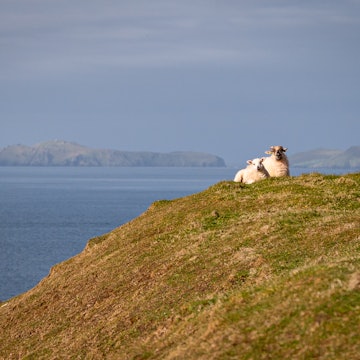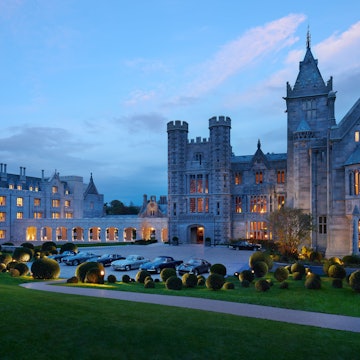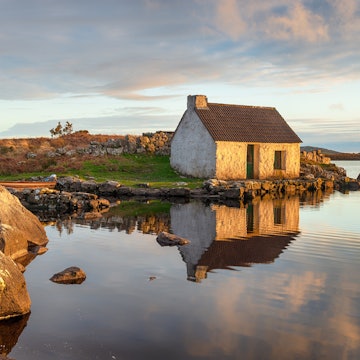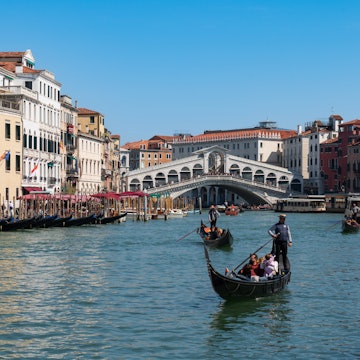
A first-time guide to Galway, Ireland



Shop Street. powerofforever/Getty Images
Compact Galway, curving its tangled lanes lined with colorful storefronts around Galway Bay, is one of Ireland's most picturesque cities. Bolstered by an energetic student population, it's also one of the country's most vibrant, with musicians striking up in its atmospheric pubs and busking on its streets, a seafood-driven culinary scene, a jam-packed calendar of events and a bohemian soul.
If you want to dive deep into Galway, here’s everything you need to know.
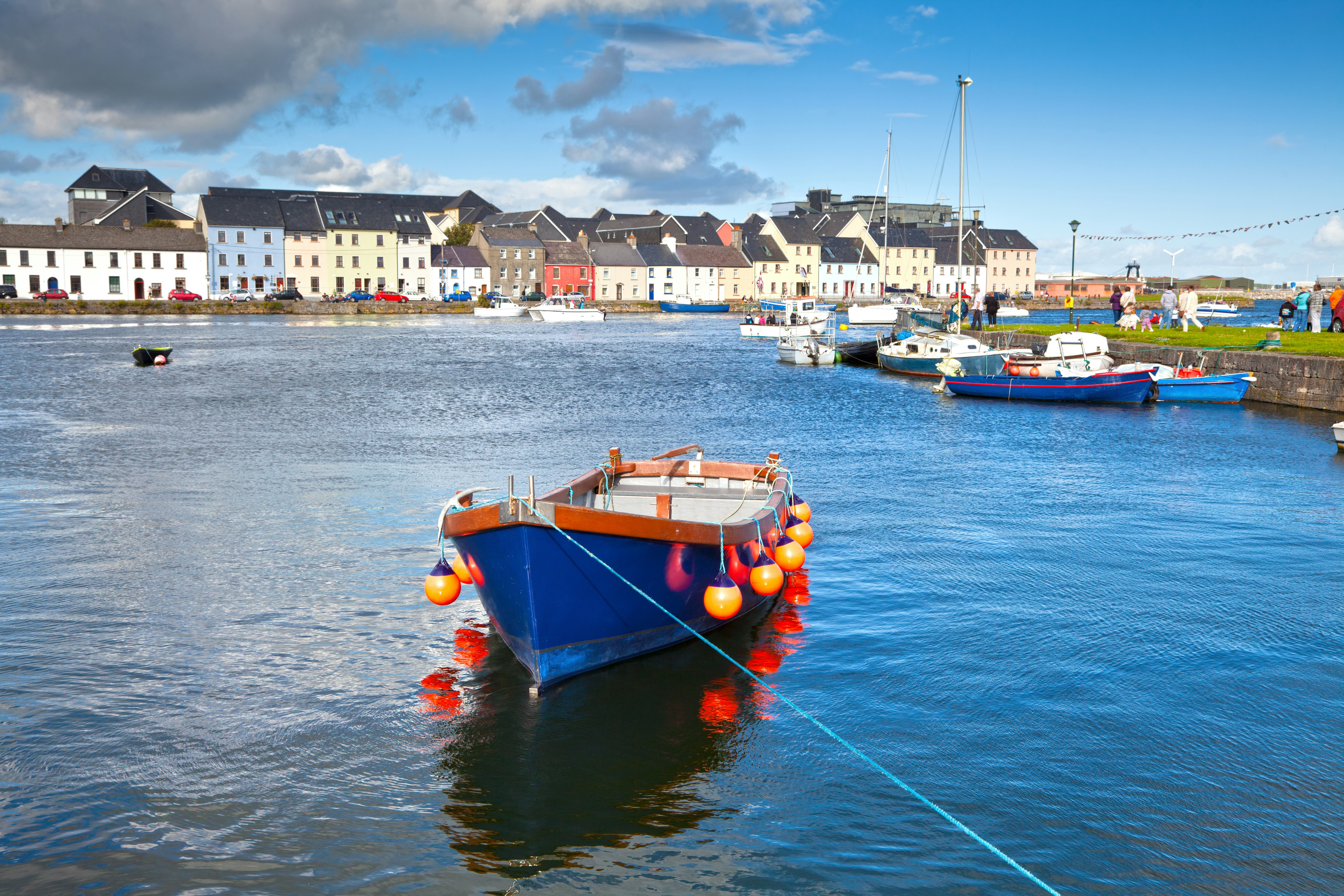
When should I go to Galway?
July and August bring long days that are perfect for exploring, but the high season also brings higher accommodation prices. And while these may be the summer months, sunshine is never a guarantee in Ireland.
The shoulder season months of April, May, September and October are great times to visit, with fewer crowds. These spring and fall months can even see stretches of exceptional weather — perhaps warmer and sunnier than in summer in some years. As always in Ireland, prepare for rain and celebrate when the sun is out.
The winter months can be cold, wet and dreary. It's not ideal for visiting, but if you happen to be in Galway in December through March, don’t fear — just pack well for the weather and expect to while away the long, dark evenings with some live music in a pub.

Galway is festive any time of year but especially during its annual celebrations (when you'll need to book accommodations well ahead). Standouts include late April's poetry- and prose-filled Cúirt International Festival of Literature; May’s Galway Theatre Festival; and July's Galway International Arts Festival and Galway Film Fleadh, Ireland's leading film festival. Horse racing and high fashion at the Galway Races Summer Festival start on the last Monday in July, and late September brings the long-running Galway Oyster and Seafood Festival. At Halloween, spectacle theater company Macnas hosts an exceptional parade that features elaborate floats and giant sculptures.
How much time should I spend in Galway?
It’s worth spending a night or two in Galway on any trip to Ireland. Two days is enough time to wander the colorful streets in search of seafood, pints and the local culture. Base yourself in Galway for a few days and add in a day trip to Connemara, the Burren or the Aran Islands.
If you’re driving the Wild Atlantic Way, Galway is the largest city on the route. Stop and enjoy the selection of pubs and restaurants before getting back on the road for more rural stretches.
Is it easy to get in and around Galway?
Galway is easily reached by train and bus from Dublin. If you want to get to Galway from any other city in Ireland, a bus is your best bet – check out routes and schedules at Bus Éireann and City Link.
Once you’re in Galway city, the central core is very walkable, and rambling (and pub-crawling) around Eyre Square and Shop Street is part of the Galway experience. Local buses provide decent connections around the city, and you can even hop on regional buses into Connemara and visit towns like Clifden.

Top things to do in Galway
Head to a pub for Guinness, whiskey and live music
Galway is famed far and wide for its pubs, most of which are just a crawl from the next. Join the friendly locals as they bounce from place to place, never knowing what fun lies ahead but certain of the possibility. A brilliant starting point is Tigh Neáchtain (or just Neáchtain's, pronounced "nock-tans"), a bright blue 19th-century treasure that attracts all walks of life beneath its low ceilings and on its tree-shaded terrace.
Pints of the black stuff (Guinness) are popular, of course, but look out for Galway Hooker Irish Pale Ale, brewing locally for over a decade. If you’re after whiskey, see the specialists at laid-back Garavan's.
Galway’s pubs heave with live music. You’ll hear high-spirited traditional tunes featuring any combination of instruments – fiddle, tin whistle, bodhrán (handheld goat-skin drum), guitar, banjo, squeeze-box – pouring out from inside. It's possible to catch a seisún (pronounced "seh-shoon") virtually every night of the week. Cherry red Tig Cóilí is a fantastic place to catch live music, as is the two-story Crane Bar.
If you like your music a little less traditional, bands of all genres get their break at legendary venue Róisín Dubh, which also hosts comedy. Bierhaus and the Blue Note invite DJs who draw in a cool crowd.
Eat delicious seafood
Seafood reigns in Galway. Terroir-focused Aniar uses local catches in many of its Michelin-starred multicourse menus. Celebrated Oscar's Seafood Bistro is a superb place for Galway Bay oysters. Ard Bia at Nimmo's serves West Coast monkfish with spiced cauliflower and chermoula; pan-roasted Atlantic hake with leek and fennel orzo, clams, and chard; and other creative choices. West Coast crab (washed down with Galway Hooker) is a specialty of hip Kai. And down-to-earth McDonagh's is an essential stop for phenomenal fish and chips at its chaotically sociable communal tables.
Learn about the city’s history
Situated at the mouth of the River Corrib, Galway started out as a fishing village, Claddagh, and really took off in the 13th century, when it came under the Anglo-Norman rule of Richard Óg de Burgh (aka the Red Earl) and its city walls were constructed. It's likely that the Spanish Arch, which protected moored merchant ships from Spain, is a remnant of the medieval walls. Another surviving portion has been incorporated into the Eyre Square Centre shopping mall. Fascinating archaeological finds are on display at the Hall of the Red Earl, a medieval tax office/ courthouse/town hall, the remains of which were uncovered by accident in 1997. In 1396, Richard II transferred power to 14 merchant-family tribes; the most powerful, the Lynch family, built Lynch's Castle, Ireland's finest town castle (now an AIB bank). More recent history – from 1800 to 1950 – is on display at the Galway City Museum, where exhibits include a traditional wooden Galway Hooker fishing boat.

Walk the prom in Salthill
Join the locals getting their 10,000 steps and take in the fresh air on the 2km (1.25-mile) seaside path along the Salthill neighborhood. If you’re feeling adventurous, join the brave souls jumping off the Blackrock Diving Tower into the bracing North Atlantic at high tide.
Go shopping
One of the joys of wandering through Galway is stumbling across its small specialty shops selling Irish-made fashion, art and jewelry – including its Claddagh rings (with a heart, signifying love, between two hands, symbolizing friendship, and topped by a crown, representing loyalty), named for the original fishing village. The jewelry shops producing them include Ireland's oldest, Thomas Dillon's Claddagh Gold, established in 1750. Other favorites include the warren of book-lined rooms making up Charlie Byrne's Bookshop, plus P Powell & Sons and Kiernan Moloney – both selling traditional Irish musical instruments.
See some theater
Galway is famous for its artistic spirit. The award-winning Druid theater group puts on exceptional and ambitious shows – check out what’s upcoming before your trip. The Town Hall Theatre also hosts plenty of performances, including music, comedy, theater and films.
How much money do I need for Galway?
Ireland isn’t cheap, and in Galway, prices aren’t much below what you’d find in Dublin. If you’re on a budget, book accommodations well in advance.
Night in a hostel dorm: €40–60 (US$47–71)
Night in a basic hotel room for two: €140–160 (US$164–188)
Night in a self-catering apartment: €200–250 (US$234–293)
Public transportation ticket: €1.90 (US$2.20)
Coffee: €3 (US$3.50)
Sandwich: €7 (US$8.20)
Dinner for two: €60–80 (US$71–94)
Beer: €6 (US$7)

What's the best day trip from Galway?
Part of the Wild Atlantic Way, Galway is on the doorstep of some of Ireland's most spectacular scenery. If you have a car, easy day trips from the city include the evocative Connemara region, with its fissured coastline, undulating bogs, empty valleys and slate-toned lakes (plus peat fire-warmed pubs), along with the plunging Cliffs of Moher and the rocky moonscape of the Burren.
Without a car, the best option is to hop on Aran Island Ferries at the Galway city docks and jet away to the island of Inishmore (Inis Mór), the largest of the Aran Islands. Once there, rent a bike and feel the freedom of zipping down country roads, stopping to relax on the white sand of Cill Mhuirbhigh beach; scout for cute animals at the seal colony, then explore the prehistoric stone fort of Dun Aengus (Dún Aonghasa). Book a ferry ticket that takes you past the Cliffs of Moher, perhaps the best way to truly get a sense of their scale.
What should I pack for a trip to Galway?
Travelers to Ireland will always benefit from packing light layers that suit the changing weather. A proper rain jacket is beneficial, as strong winds off the Atlantic can render the highest quality umbrella useless. You won't regret having footwear that will keep your feet dry.







